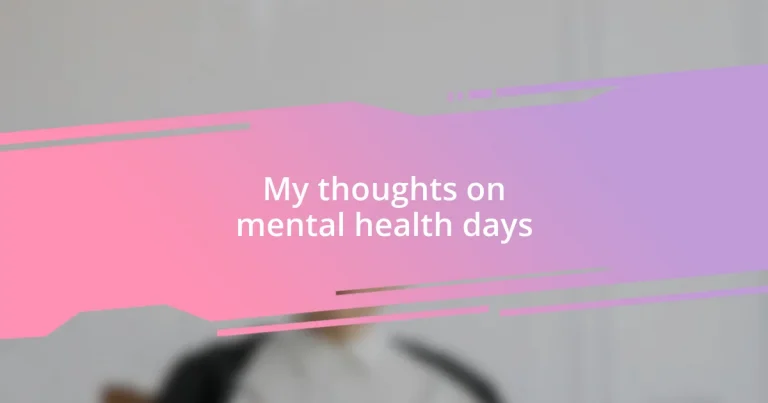Key takeaways:
- Mental health days are essential for recharging and enhancing productivity, promoting a better work-life balance.
- Acknowledging the signs of needing a break is crucial to prevent burnout and improve overall mental health.
- Implementing daily practices like gratitude journaling and maintaining a supportive network significantly contribute to long-term mental wellness.
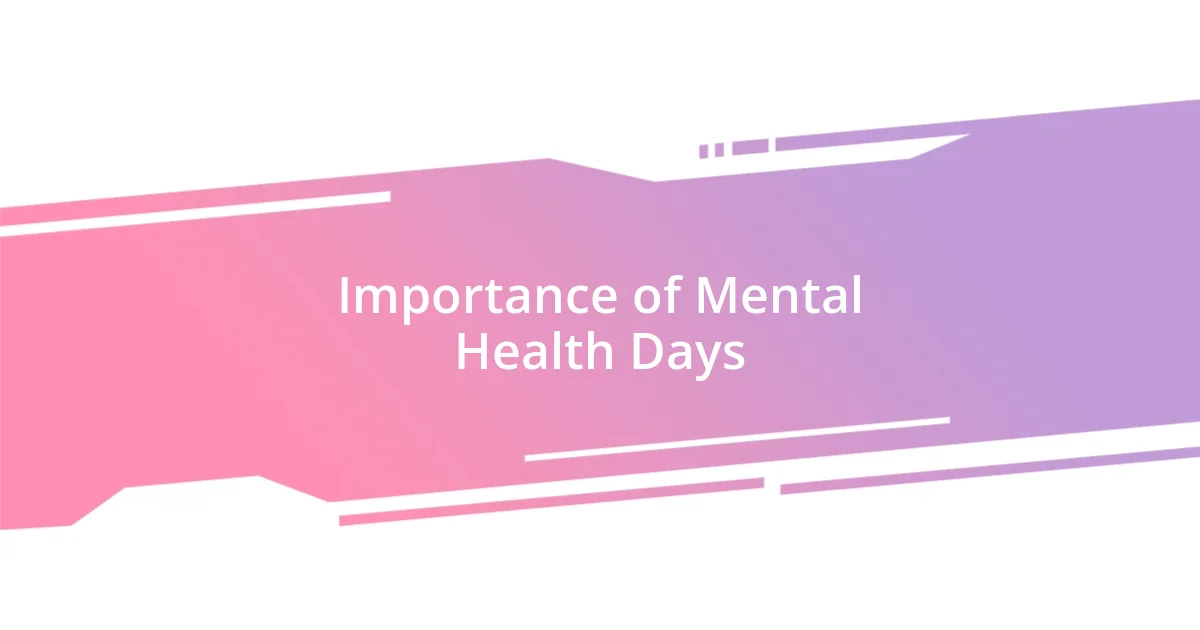
Importance of Mental Health Days
Taking a mental health day isn’t just a luxury; it’s a necessity for many of us. I remember a time when I was overwhelmed with work and personal commitments, and I felt like I was running on empty. After taking just one day to recharge, I returned with new energy and clarity, realizing how crucial those breaks can be for our overall well-being.
Mental health days serve as a reminder that we are not machines. Isn’t it interesting how we often prioritize our physical health over our mental health? I’ve seen colleagues push through exhaustion, only to burn out entirely. When I take the time to step back and reflect, I come back not only refreshed but also more productive and creative. These breaks help us acknowledge our limits and foster a healthier work-life balance.
Moreover, the simple act of disconnecting can lead to significant emotional breakthroughs. Have you ever stepped away from stress and suddenly found clarity in your thoughts? I find that when I allow myself a moment to breathe, I often rediscover passions or solutions that eluded me in the chaos. Embracing mental health days promotes resilience, enabling us to navigate life’s challenges with a clearer mind and a stronger heart.
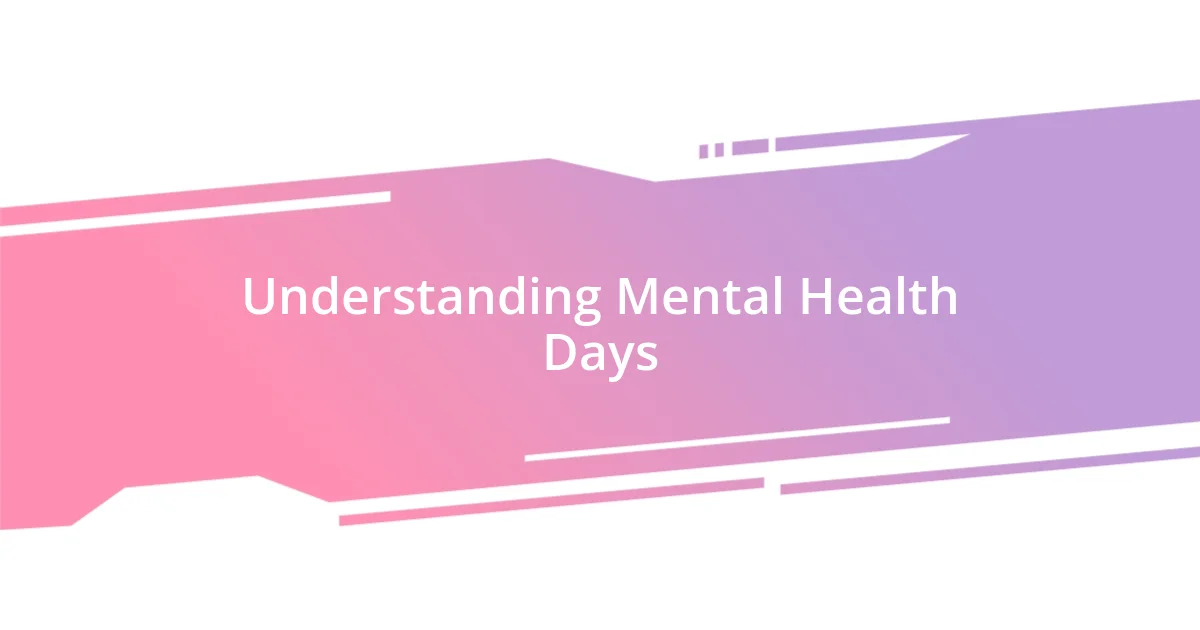
Understanding Mental Health Days
Understanding mental health days is essential for recognizing our human need for rest and recuperation. It’s not just about taking time off work; it’s about reclaiming your well-being. I remember when I was feeling overwhelmed by my daily routine. I decided to set aside a day purely for self-care. I found myself enjoying activities that I usually neglected, like reading a book and taking long walks. This not only lifted my spirits but also helped me reconnect with myself.
Here are some key insights into mental health days:
- They provide a necessary pause to recharge mentally and emotionally.
- Taking time off can lead to increased productivity upon returning to work.
- Mental health days encourage self-reflection and personal growth.
- They help to prevent burnout, which can have long-term consequences.
- These days foster a more compassionate approach to mental health, both for ourselves and others.
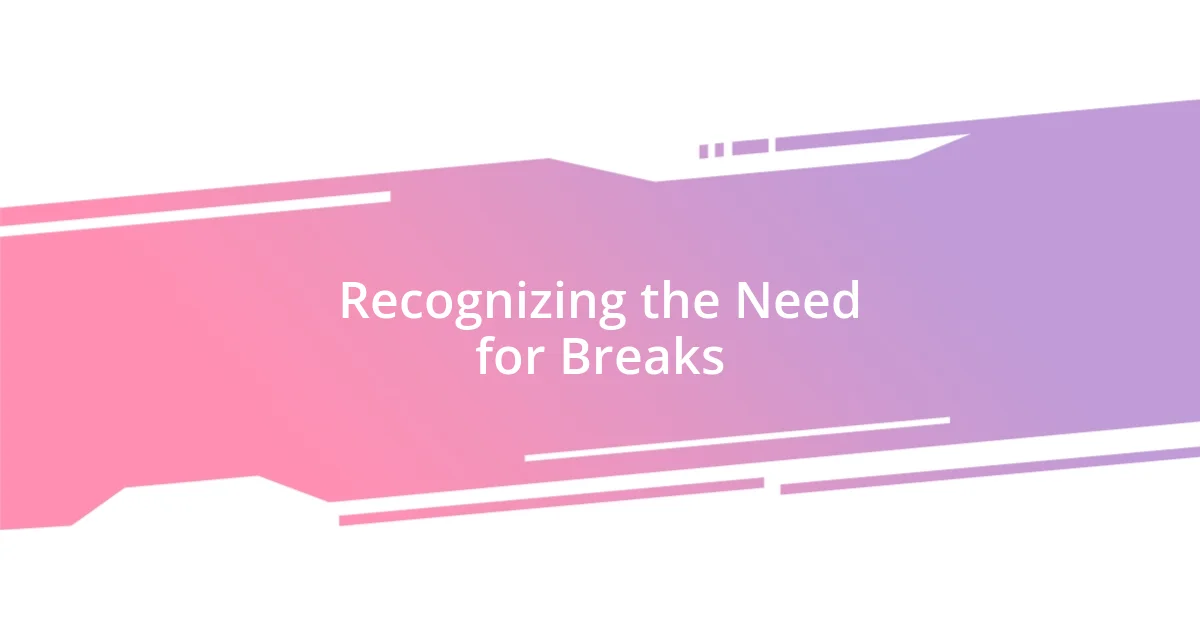
Recognizing the Need for Breaks
Recognizing the importance of taking breaks is often more challenging than it should be. I distinctly remember the times I ignored my body’s signals—feeling fatigued and irritable—only to push through my responsibilities. But when I finally acknowledged my need for a break, I discovered the profound difference it made in my perspective and productivity.
There’s a certain clarity that comes when we allow ourselves to pause. I had days where everything felt like too much, and I’d just snap at the small things. After a much-needed break, I returned with a fresh mindset, where I could view challenges as opportunities. It’s amazing how stepping back can reduce stress and help us navigate our tasks more effectively, leading to not just better performance, but a more enjoyable work environment.
Ignoring these signs of needing a break can lead to detrimental effects on our mental and emotional health. I once pushed through a particularly stressful week, thinking it was a sign of strength. In hindsight, it only led to burnout. Being attuned to our own needs and recognizing when to hit pause is crucial; it allows us to return to our responsibilities with renewed energy and focus.
| Signs You Need a Break | Potential Outcomes |
|---|---|
| Increased Fatigue | Burnout |
| Difficulty Concentrating | Decreased Productivity |
| Irritability | Strained Relationships |
| Physical Symptoms (like headaches) | Long-Term Health Issues |
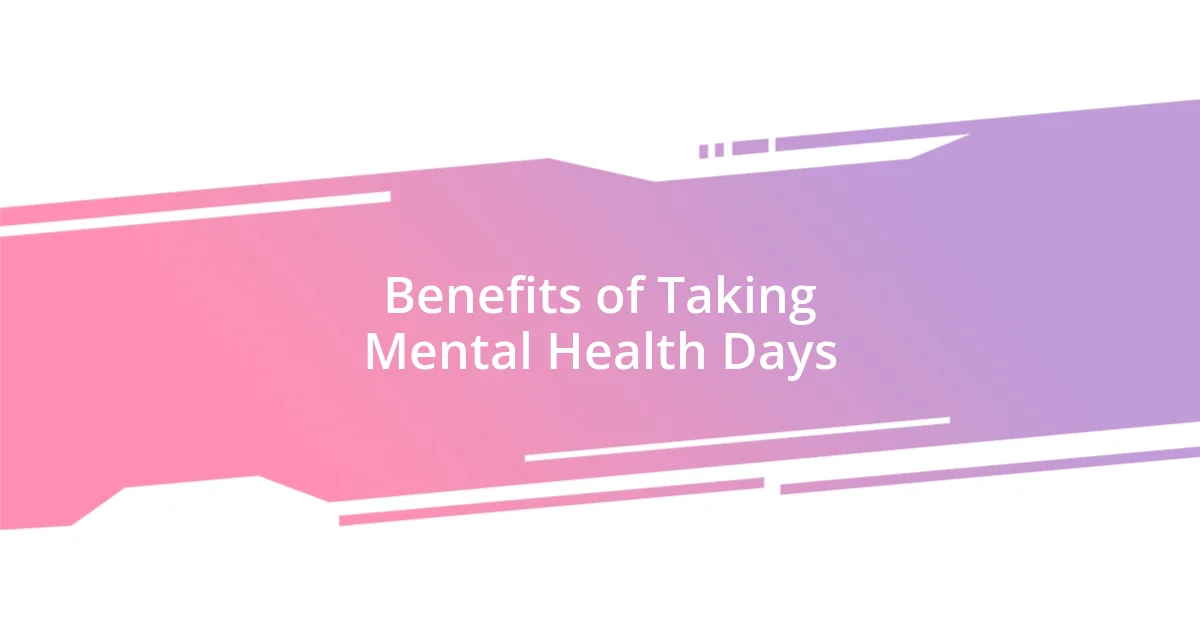
Benefits of Taking Mental Health Days
Taking mental health days offers a unique opportunity to rejuvenate ourselves, and I’ve experienced this firsthand. There were times when I simply couldn’t focus due to constant pressure; I would reach a point where everything felt overwhelming. After taking a mental health day, I returned to my usual tasks with clarity and motivation. Isn’t it interesting how a little time away can spark renewed enthusiasm?
These days can also boost productivity significantly. I vividly remember a period when deadlines were piling up, and I was drowning in stress. By stepping away for a day, I recharged my mental batteries and approached my work with a fresh outlook. It was like hitting a reset button on my brain—my focus sharpened, and I accomplished more in the following days than I ever thought possible.
Additionally, prioritizing mental health fosters a culture of compassion and understanding. When I started openly discussing my mental health days with colleagues, I noticed something remarkable. Others began to share their experiences, breaking down stigma and creating an atmosphere where making time for oneself is seen as strength, not weakness. Isn’t it refreshing to know that by taking care of ourselves, we can inspire others to do the same?

How to Communicate Your Needs
Communicating your needs can feel daunting, especially in a busy work environment. I remember the first time I had to speak up about needing a mental health day. It felt uncomfortable, but I framed it as a necessary step for my productivity and well-being. By expressing that it was not a weakness, but rather a way to ensure I could bring my best self to work, I was met with understanding instead of judgment.
Using “I” statements when expressing your needs can be incredibly effective. It puts the focus on your experience rather than making it seem like a broader critique of the environment. For instance, saying “I feel overwhelmed and need some time to recharge” makes it clear that your request is about self-care, rather than a reflection on others’ work. I’ve found that this approach not only clarifies my situation but opens the door for support, creating a dialogue rather than a demand.
It’s also essential to establish a precedent for openness—let others know ahead of time that mental health discussions are welcome. Once, during a team meeting, I shared my experience of taking a mental health day, and to my surprise, several colleagues opened up about their own struggles. It created an atmosphere of vulnerability and support that made it much easier for everyone to express their own needs moving forward. How empowering it was to transform a potentially uncomfortable topic into a shared experience!
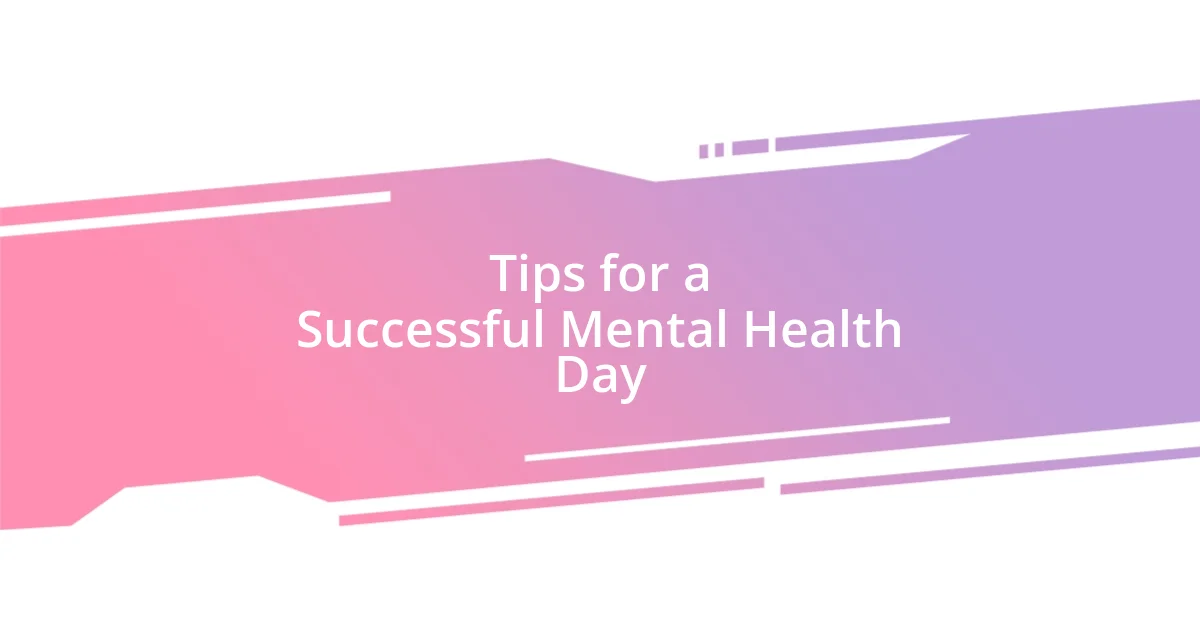
Tips for a Successful Mental Health Day
Planning a successful mental health day involves setting clear intentions for how you’ll spend that time. I remember one particular day when I decided to disconnect completely from technology. It was liberating! I explored nature, indulged in my favorite book, and took the time to simply breathe. This experience taught me the importance of being mindful about how I could nurture my well-being during that day.
Another tip is to create a structured but flexible schedule for your day. I once made the mistake of not planning and ended up feeling just as chaotic as I did before. By blocking out time for specific activities—like yoga in the morning or journaling in the afternoon—I found a rhythm that kept me engaged and relaxed throughout the day. It’s amazing how having a plan can turn a day of rest into a day of discovery.
Don’t forget to check in with your emotions throughout the day. I often ask myself how I’m feeling and what I need at the moment. Sometimes, I realize I just want to watch a light-hearted movie; other times, I might feel the urge to reflect on my thoughts. By listening to myself and allowing for spontaneity, I can truly make the most out of my mental health day. What activities make you feel most at ease? Understanding that can guide your choices and deepen the restorative experience.
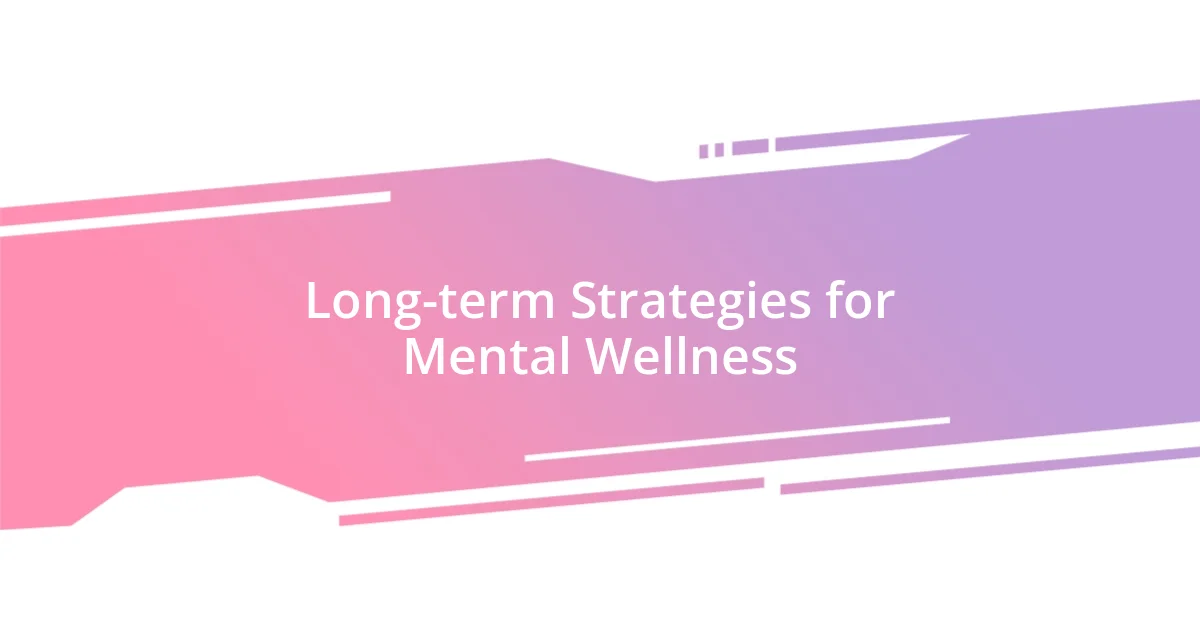
Long-term Strategies for Mental Wellness
I’ve always believed that integrating small, daily practices into my routine has made a significant difference in my long-term mental wellness. For me, something as simple as a morning gratitude journal has been transformative. Each day, I jot down three things I’m thankful for, and it surprisingly shifts my perspective, helping me focus on the positive. Have you ever tried this? It’s amazing how this little habit can foster resilience over time.
Another effective strategy I’ve found is engaging in regular physical activity. Funnily enough, I used to dread exercise, thinking it was a chore. However, once I discovered activities that I genuinely enjoy—like dancing or hiking—it became more than just a workout. It turned into a source of joy and a natural stress reliever. I often wonder how many people might find joy in moving their bodies if they explored different activities rather than sticking to traditional exercises.
Lastly, establishing a strong support system has been crucial for my mental health. I cherish the few close friends I can turn to during tough times. One afternoon, I reached out to a friend when I was feeling particularly low, and just talking about my feelings lifted a huge weight off my shoulders. It’s interesting—how often do we underestimate the power of simply connecting with someone who understands? Building these relationships not only fosters a sense of community but also creates a safety net that we can fall back on in challenging moments.












